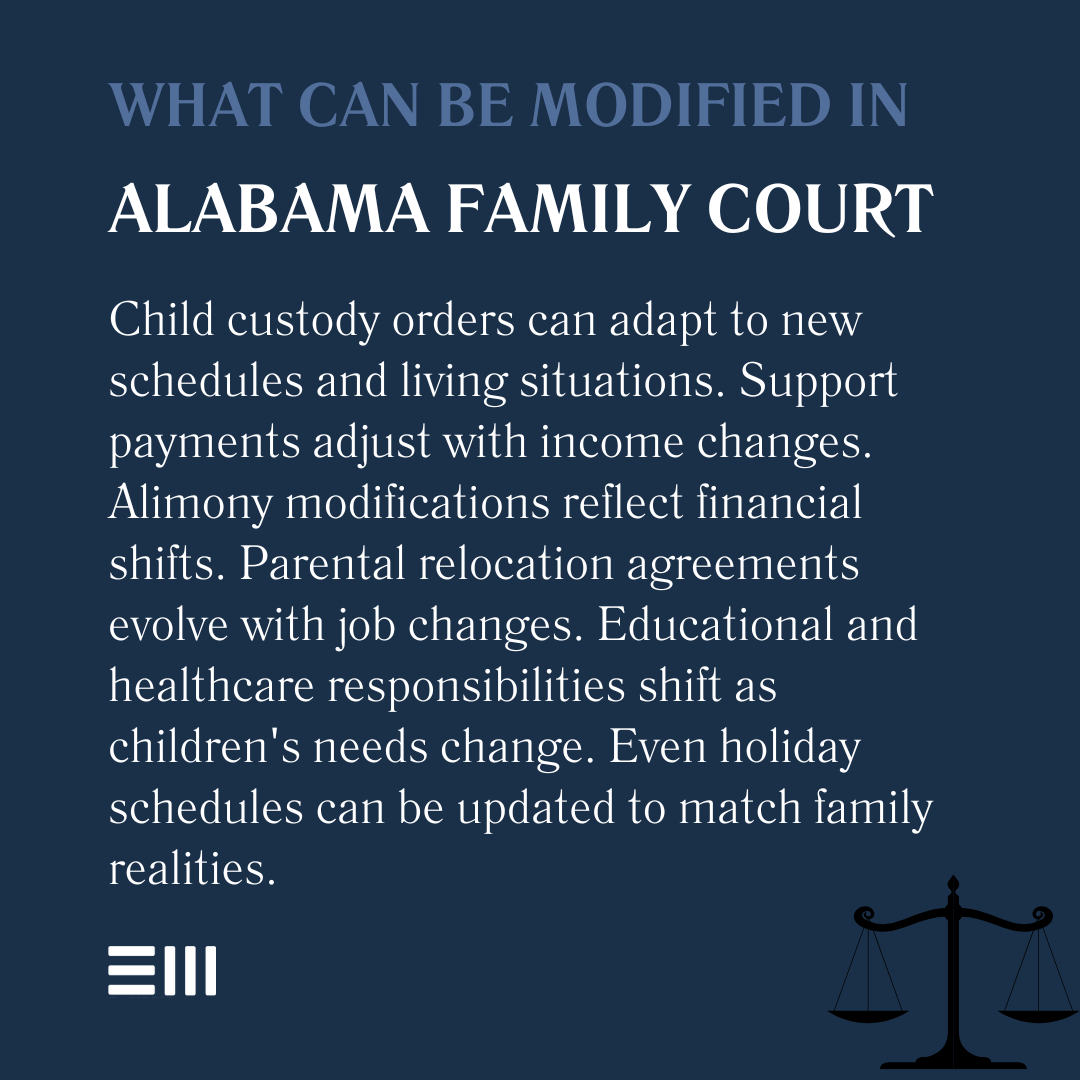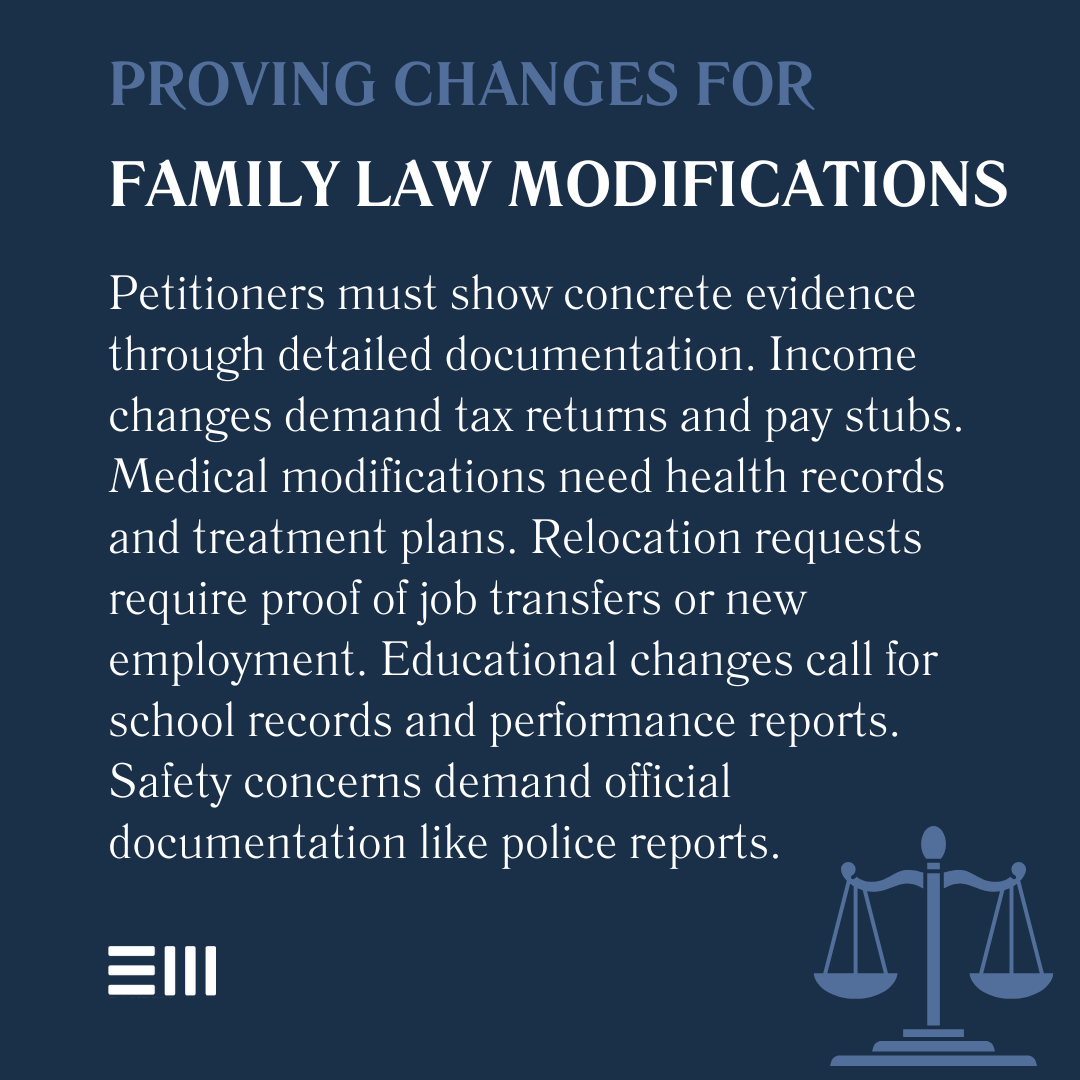Job promotions, career changes, relocations, and evolving children's needs reshape family dynamics long after the final bang of a judge's gavel.
While court orders create essential frameworks for divorced and separated families, they cannot anticipate every twist in life's journey.
Alabama's family courts recognize this reality, providing clear paths to modify existing orders when circumstances demand change.
From custody schedules to support payments, these modifications help bridge the gap between past agreements and present realities.
Understanding Family Law Modifications in Alabama
The Alabama court system recognizes that life circumstances change over time. While original court orders serve as vital blueprints for family arrangements, they sometimes require updates to remain practical and fair for all parties involved.
The state's family courts have developed comprehensive guidelines to help families navigate these changes while maintaining stability and protecting all parties' interests.
Common Reasons for Modifications
Family law modifications often stem from significant life changes affecting one or more parties. Understanding these catalysts helps families better prepare their modification requests and gather appropriate supporting evidence.
Major changes can include:
- Substantial income changes through job loss, promotion, or career change, including unexpected layoffs or business failures;
- Relocation necessities due to employment or family obligations, particularly when moving more than 60 miles from the current residence;
- Changes in children's educational or medical needs, including special education requirements or newly diagnosed conditions;
- Remarriage affecting living arrangements or financial situations, especially when step-families merge;
- Health issues impacting parenting ability or financial resources, including chronic conditions or unexpected disabilities;
- Substance abuse or behavioral problems affecting child safety and requiring immediate intervention;
- Military deployment or extended work assignments requiring temporary or permanent schedule adjustments;
- Changes in childcare arrangements or availability affecting custody schedules;
- Significant alterations in work schedules impacting visitation capabilities;
- Educational opportunities requiring schedule modifications; and
- Extended family support changes affecting childcare arrangements.
These changes can profoundly impact the feasibility of existing arrangements, necessitating formal modifications through the court system. Each situation requires careful documentation and presentation to demonstrate the necessity of requested changes.
Types of Orders That Can Be Modified
Alabama courts allow modifications to various family law orders based on changed circumstances, recognizing the need for flexibility in family arrangements while maintaining stability.
Primary categories include:
- Child custody and visitation schedules, including primary residence determinations;
- Child support payment amounts based on income changes or needs;
- Alimony or spousal support arrangements, particularly when financial circumstances shift;
- Parent relocation agreements requiring distance considerations;
- Educational expense arrangements for private school or college;
- Healthcare responsibility divisions and insurance coverage;
- Tax dependency arrangements and financial planning;
- Holiday and special occasion schedules requiring updates;
- Transportation responsibilities for visitation;
- Decision-making authority modifications;
- Extracurricular activity participation and cost-sharing; and
- Communication methods and requirements between parties.
Each type of modification requires specific evidence and documentation to support the requested changes, ensuring all adjustments serve the family's best interests and maintain the necessary stability for the children involved.
Legal Requirements for Modifications
Before pursuing a modification in Alabama, petitioners must demonstrate a material change in circumstances warranting the adjustment.
Courts carefully weigh these changes against the stability of existing arrangements, considering both short-term and long-term impacts on all parties involved.
Proving Material Change
Successful modification requests typically require substantial evidence demonstrating significant life changes that affect the current arrangement's viability.
Required documentation often includes:
- Documentation of significant income changes through pay stubs and tax returns;
- Evidence of relocation necessity including job offers or transfer orders;
- Medical records supporting health-related changes and ongoing treatment needs;
- School records showing educational needs or performance changes;
- Evidence of changed living conditions through lease agreements or home purchases;
- Documentation of safety concerns including police reports or protective orders;
- Proof of other substantial life changes affecting family dynamics;
- Financial statements showing income and expense modifications;
- Employment verification letters detailing schedule changes;
- Evidence of changed childcare arrangements or costs;
- Documentation of new special needs or medical conditions; and
- Proof of transportation or logistics challenges.
These elements help courts evaluate whether modifications serve the best interests of all parties involved, particularly any children affected by the changes. Courts carefully review all evidence to ensure that requested modifications are necessary and appropriate.
The Modification Process in Alabama
Navigating the modification process requires careful attention to legal procedures and documentation requirements.
Understanding each step helps ensure a smoother process and increases the likelihood of successful modifications.
Steps to Modify Family Law Orders
The modification journey involves several key phases that must be completed in proper sequence:
- Filing a petition for modification with proper documentation and supporting evidence;
- Serving notice to all affected parties through approved legal channels;
- Attending mediation sessions when required by the court;
- Gathering evidence supporting the modification request from various sources;
- Preparing financial statements and supporting documents for court review;
- Participating in court hearings if necessary to present evidence;
- Implementing new arrangements after approval from the judge;
- Following up on any required post-modification actions;
- Maintaining detailed records of compliance with new arrangements;
- Addressing any enforcement issues that arise;
- Documenting ongoing changes that may affect the modified order; and
- Participating in any required parenting classes or counseling.
Following these steps carefully helps avoid delays and improves the likelihood of successful modifications. Each phase requires attention to detail and proper documentation to support the requested changes.
Frequently Asked Questions About Family Law Modifications in Alabama
Many Alabama residents share common questions about modifying family law orders.
Understanding these key points helps families better prepare for the modification process.
How Much Does It Cost to Modify a Family Law Order?
Filing fees vary by county in Alabama, typically ranging from $200 to $400.
Additional costs may include attorney fees, mediation expenses, document preparation charges, and expert witness fees if needed. Financial assistance or payment plans may be available for qualifying individuals.
How Long Does the Modification Process Take?
The timeline for modifications can span from three months to over a year, depending on case complexity, court schedules, and whether both parties agree to the changes.
Contested modifications typically take longer due to required hearings and evidence presentation.
What if the Other Party Refuses to Agree to Modifications?
While agreement simplifies the process, courts can order modifications without consent if evidence shows significant changes warranting adjustment.
Mediation may be required before proceeding to a hearing, offering opportunities for compromise.
Can I Request Multiple Modifications at Once?
Courts often allow consolidated modification requests, potentially saving time and reducing costs when multiple changes are needed. This approach requires careful organization of evidence for each requested change.
When Can I File for Another Modification?
While no specific waiting period exists, courts generally expect circumstances to remain stable for some time after modifications unless emergency situations arise.
Repeated modification requests without substantial changes may be viewed unfavorably.
Special Needs Trusts work best as part of a comprehensive planning strategy. Understanding how these trusts interact with other tools maximizes their effectiveness.
Secure Your Family's Future Today
Your family's needs evolve, and your legal arrangements should reflect these changes. Our experienced family law team understands Alabama's modification requirements and can help you navigate this complex process.
Contact us for a consultation to discuss your modification needs and protect your family's interests.
Let us help you create a stable foundation for your family's future through properly structured legal modifications.


